(1) JICA Volunteer Program
About the Program
The Japan Overseas Cooperation Volunteers (JOCV) Program supports development areas in the Philippines since 1966. JOCVs teach communities self-reliance through the technical expertise of the volunteers in various fields.
The JOCVs live in the communities for two years where they learn local language and culture and implement projects on specific causes. They work closely with different government agencies and local organizations to advance development, and strengthen the friendship of Japanese and Filipinos.
History of the Japan Overseas Cooperation Volunteers
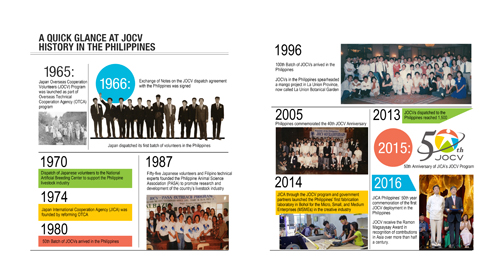
Recognitions Received
- The JICA Volunteers received the 2016 Ramon Magsaysay Award, Asia's Nobel Prize equivalent for promoting mutual understanding and solidarity, and in giving voice to the needs of grassroots communities.
- A Special Citation on Volunteerism was also conferred to the JICA volunteers in the Philippines by the Philippine National Volunteer Service Coordinating Agency (PNVSCA), an attached agency of the National Economic and Development Authority (NEDA), for their contribution to human resource development in the country.
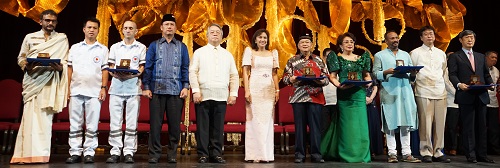
JICA President Shinichi Kitaoka (far right) and former JOCV Dr. Kenichi Kubota (second from right) at the Ramon Magsaysay Award ceremonies in Manila
Areas of Assistance
The JOCV Program strives to support the following pillars of assistance of the Japan International Cooperation Agency (JICA) in the Philippines:
1) Strengthening a Foundation for Sustainable Economic Growth
Some of the JOCVs' activities include human resource development, skills trainings, product development, and marketing to expand economic opportunities of the communities
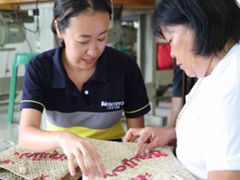
Teaching global market trends with women's associations in Siquijor
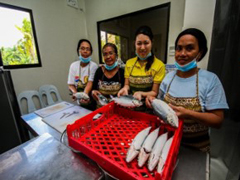
Training women on livelihood skills in Samar
2) Ensuring Human Security for Inclusive Growth
JOCVs work also include enhancing basic social services like education, health, agriculture, environment, and other welfare services enabling vulnerable people improve the quality of their lives.
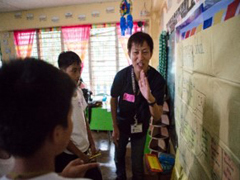
Supporting disaster awareness and preparedness in schools and barangays in Bicol
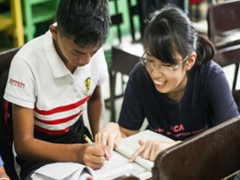
Introducing techniques in Math teaching in Leyte
JOCV CATEGORIES OF SPECIALTIES
- Agriculture/Fishery: vegetable growing, livestock and dairy products processing, veterinary medicine, animal husbandry, aquaculture
- Manufacturing: machine tools, welding, automobile maintenance, carpentry, food processing, ceramics, packaging
- Human Resources: environmental education, cooking, science education, mathematics education, primary school education, early childhood education, design
- Health/Healthcare: public health nursing, midwifery, occupational therapy, physical therapy, nutrition, public health
- Planning/Government: community development, disaster risk reduction and management, information communications and technology
- Social Welfare Services: welfare and education for persons with disabilities
- Business/Tourism: marketing, tourism
For full list of specialties:
(2) Cooperation with NGOs
JICA and NGOs in the Philippines
While the assistance of JICA is basically on a government-to-government basis, JICA has been working with NGOs in various ways in recognition of the importance of the roles of Non-Governmental Organizations (NGOs) for nation building, human development and international cooperation. In the Philippines, NGOs who have varied scope and expertise are active in a variety of development activities in the communities.
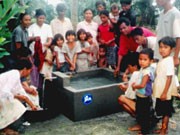
Water System Development for IPs
With this recognition, JICA has been promoting collaboration with Japanese and Philippine NGOs, particularly in implementing projects at the grassroots level. Other working experiences with include participation of NGOs in Third Country Training Program (TCTP) and partnership with NGOs through dispatch of Japanese Overseas Cooperation Volunteers (JOCV).
JICA Philippine Office has also established an NGO-JICA Japan Desk (NGO Desk) in January 2003 whose main objective is to promote the participation of Japanese groups or individuals in implementing international cooperation activities.
NGO Desk's main activities are as follows;
1.To support the activities of Japanese NGOs and other Partners in the Philippines
- Gather information on NGO activities in the Philippines, as well as information on visa, SEC registration, Philippine laws, and other related information for Japanese NGOs
- Hold consultations and respond to various NGO related queries
- Conduct study sessions/seminars for both Japanese and Philippine NGOs
- Network with other Donor Agencies with Small Grants Facilities (the Small Grants Donors Group is composed of the UNDP GEF/SGP/RNE, AUSAID, British Embassy, Canada Fund for Local Initiatives, DISOP Philippines, Spanish Embassy, New Zealand Embassy, European Commission, Embassy of Japan, and NGO-JICA Japan Desk)
2.To facilitate the promotion of cooperation projects between JICA and NGOs
- Support the formulation and implementation of Technical Cooperation for Grassroots Projects, especially in gathering information through project site visits and partner consultations
3.To strengthen cooperation among Japanese NGOs, Local NGOs and JICA
4.To support exchanges between Japanese groups or individuals and the Philippines
- Support international citizens' cooperation/exchange activities through information gathering and dissemination, acceptance of study tours, and development studies, among others
NGO Desk implements and manages two assistance schemes for NGOs namely; Technical Cooperation for Grassroots Projects (TCGP) and Community Empowerment Program (CEP).
TCGP was introduced in 2002 to support the implementation of projects formulated by Japanese NGOs, local governments and universities who wish to utilize their accumulated knowledge and experience in assisting developing countries. Local NGOs in recipient countries may engage in this scheme by being the Counterpart of the Japanese NGOs or as beneficiaries of the Project. Projects can be implemented for a maximum of three (3) years. The list of on-going projects is available in the List of JICA Activities.
On the other hand, CEP was introduced in 1997 as one component of JICA's Technical Cooperation Projects (TCP). Under this scheme, Local NGOs enters a contract with JICA Philippine Office and are entrusted with the implementation of projects. However, it should be noted that the projects proposals should be related to an on-going Technical Cooperation Project of JICA.
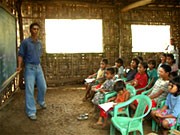
Mangyan Literacy Program
Assistance Schemes for Grassroots Cooperation
JICA welcomes in-depth grassroots collaboration of the sort that fulfills the needs of ordinary people in developing countries, especially projects which bilateral governmental programs cannot reach effectively, such as those with strong focus on health, education, livelihood and the environment.




scroll